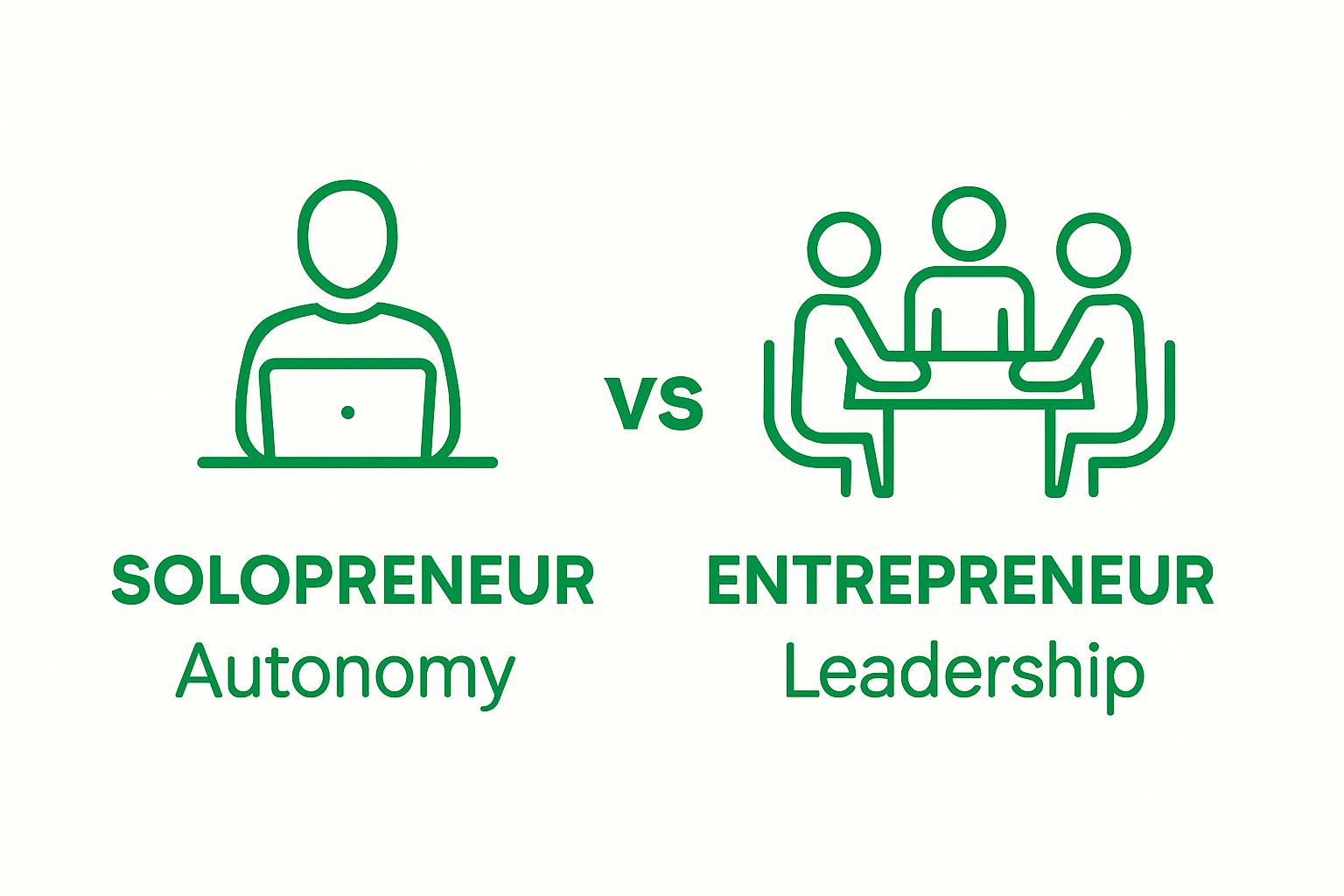
Understanding Solopreneur vs Entrepreneur: Key Differences
Choosing between being a solopreneur or an entrepreneur shapes every part of your business life. One surprising fact is that solopreneurs manage every task alone, often enjoying lower overhead and higher day-to-day control than most startups handle with teams. Most people think entrepreneurs always have the bigger advantage or income, but up-close the story is not that simple. Picking the right path for your goals could lead to more freedom, satisfaction, or even unexpected financial results depending on what really matters to you.
Table of Contents
- Defining Solopreneurs And Entrepreneurs
- What Is A Solopreneur?
- What Defines An Entrepreneur?
- The Importance Of Understanding The Distinction
- Strategic Business Planning
- Financial And Personal Development Implications
- Career Path Navigation
- Key Characteristics Of Solopreneurs
- Personal Skill And Service Orientation
- Operational And Financial Independence
- Adaptability And Continuous Learning
- Key Characteristics Of Entrepreneurs
- Visionary Strategic Thinking
- Risk Management And Resilience
- Leadership And Team Development
- Real-World Examples And Context
- Solopreneur Success Stories
- Entrepreneurial Transformation Narratives
- Comparative Business Evolution
Quick Summary
Defining Solopreneurs and Entrepreneurs
Solopreneurs and entrepreneurs are both business professionals who create and manage ventures, but they differ significantly in approach, scale, and operational strategy.
To clarify the important distinctions between solopreneurs and entrepreneurs, this comparison table summarizes their key differences in approach, structure, and focus.
What is a Solopreneur?
A solopreneur is an individual who runs an entire business single-handedly, wearing multiple hats and managing all aspects of the enterprise independently. Unlike traditional entrepreneurs, solopreneurs typically operate as a one-person show, providing services or creating products without hiring employees or building large organizational structures. Their businesses are often characterized by:
- Minimal operational complexity
- Direct personal service delivery
- Lower overhead costs
- High personal involvement and control
Common solopreneur roles include freelance writers, graphic designers, consultants, coaches, and independent contractors who leverage their specialized skills directly in the marketplace.
What Defines an Entrepreneur?
Entrepreneurs, by contrast, focus on building scalable businesses with growth potential, often involving multiple team members, significant capital investment, and broader market strategies. According to Harvard Business Review, entrepreneurs are risk-takers who identify market opportunities, develop innovative solutions, and create organizations designed to expand beyond their personal capabilities.
Key characteristics of entrepreneurs include:
- Vision for large-scale business growth
- Willingness to hire and manage teams
- Potential for raising external investment
- Focus on building transferable, sustainable business models
While solopreneurs prioritize personal autonomy and direct service, entrepreneurs aim to create enterprises that can function and grow independently of their constant direct involvement.
This table organizes the core characteristics of solopreneurs and entrepreneurs to highlight their different strengths, skillsets, and approaches to building a business.

The Importance of Understanding the Distinction
Recognizing the nuanced differences between solopreneurs and entrepreneurs is crucial for aspiring business professionals. This understanding enables individuals to design strategic approaches aligned with their personal goals, skills, and resources.
Strategic Business Planning
The solopreneur vs entrepreneur distinction directly impacts business strategy and resource allocation. Solopreneurs typically design businesses around personal skills and lifestyle preferences, while entrepreneurs focus on creating scalable, potentially transferable business models. According to research from the National Center for Biotechnology Information, self-employed individuals with broader operational strategies tend to demonstrate higher income potential and business sustainability.
Key strategic considerations include:
- Long-term business scalability
- Personal skill utilization
- Resource investment requirements
- Growth and expansion potential
Financial and Personal Development Implications
Understanding these business models influences not just professional trajectories but personal development. Solopreneurs prioritize autonomy and direct service delivery, whereas entrepreneurs concentrate on building comprehensive organizational infrastructures. This fundamental difference affects income generation, professional satisfaction, and personal growth opportunities.
Critical distinctions impact:
- Income generation strategies
- Professional networking approaches
- Personal skill development requirements
- Work-life balance expectations
Career Path Navigation
Choosing between solopreneur and entrepreneur paths requires honest self-assessment of personal strengths, risk tolerance, and professional objectives. While solopreneurs excel in specialized, personally driven ventures, entrepreneurs thrive in complex, team-oriented environments. Explore more about business strategy alignment to make an informed decision that resonates with your unique professional vision.
Key Characteristics of Solopreneurs
Solopreneurs represent a unique breed of business professionals who leverage personal skills and autonomy to create sustainable, personalized business models. Understanding their distinctive characteristics helps aspiring business owners recognize the potential and challenges of this entrepreneurial approach.
Personal Skill and Service Orientation
Solopreneurs fundamentally build businesses around their individual expertise and professional capabilities. Unlike traditional entrepreneurs, they focus on directly delivering specialized services or products that stem from their personal skills. According to research from the Kauffman Foundation, independent professionals who capitalize on their unique talents demonstrate higher job satisfaction and professional autonomy.
Key personal skill characteristics include:
- Deep specialization in specific professional domains
- Direct service delivery without intermediaries
- High-quality, personalized client interactions
- Continuous professional skill development
Operational and Financial Independence
Operational independence is a hallmark of solopreneur business models. These professionals typically manage all aspects of their business single-handedly, from marketing and client acquisition to financial management and service delivery. Their business structures are lean, efficient, and primarily focused on maximizing personal earning potential.

Critical operational characteristics encompass:
- Low overhead and minimal operational complexity
- Direct control over business processes
- Flexible work arrangements
- Personal brand as primary business asset
Adaptability and Continuous Learning
Successful solopreneurs excel in adaptability and embrace continuous learning as a core business strategy. They remain agile, quickly adjusting their service offerings to market demands and technological changes. Check out our guide on professional growth strategies to understand how solopreneurs maintain competitive edges in dynamic professional landscapes.
Key Characteristics of Entrepreneurs
Entrepreneurs represent a dynamic group of business innovators who transform ideas into scalable, impactful ventures. Their unique characteristics distinguish them from other business professionals, driving significant economic and technological advancement.
Visionary Strategic Thinking
Entrepreneurs possess an extraordinary ability to envision complex business opportunities where others see challenges. According to OpenStax research, successful entrepreneurs demonstrate remarkable traits like ambition, independence, self-confidence, and risk-taking capabilities.
Key strategic thinking characteristics include:
- Ability to identify unmet market needs
- Comprehensive long-term business planning
- Advanced problem-solving skills
- Capacity to anticipate market trends
Risk Management and Resilience
Entrepreneurs are not reckless risk-takers but calculated strategists who understand and navigate complex business landscapes. They embrace uncertainty as an opportunity for growth, developing robust mechanisms to mitigate potential challenges. Their resilience enables them to pivot strategies, learn from failures, and continuously adapt their business models.
Critical resilience characteristics encompass:
- Emotional intelligence
- Comfort with calculated uncertainty
- Rapid learning and adaptation
- Persistent goal orientation
Leadership and Team Development
Unlike solopreneurs, entrepreneurs excel in building and leading comprehensive teams. They create organizational cultures that foster innovation, collaboration, and collective goal achievement. Discover more about entrepreneurial leadership strategies to understand how top entrepreneurs transform individual potential into collective success. Their leadership extends beyond managing personnel to inspiring and developing talent that drives organizational growth.
Real-World Examples and context
Examining concrete scenarios helps illuminate the nuanced differences between solopreneurs and entrepreneurs, providing tangible insights into their distinct operational approaches and strategic mindsets.
Solopreneur Success Stories
Solopreneurs typically build businesses around specialized personal skills, creating lean, personalized professional models. According to OpenStax’s Introduction to Business, these professionals often leverage individual expertise to generate sustainable income.
Notable solopreneur examples include:
- Freelance graphic designers developing independent creative practices
- Independent software developers creating and selling niche digital products
- Consultants providing specialized industry expertise
- Online course creators monetizing personal knowledge
Entrepreneurial Transformation Narratives
Entrepreneurs distinguish themselves by building scalable organizations that extend beyond individual capabilities. Their success hinges on creating systems and teams that can operate independently of their direct involvement. Companies like Amazon, founded by Jeff Bezos, exemplify this approach of transforming initial concepts into expansive, multifaceted business ecosystems.
Characteristic entrepreneurial journeys demonstrate:
- Rapid business model iterations
- Strategic team and infrastructure development
- Capacity to attract external investment
- Vision for large-scale market disruption
Comparative Business Evolution
The divergent paths of solopreneurs and entrepreneurs become evident when examining long-term business trajectories. While solopreneurs maintain focused, personalized service models, entrepreneurs construct complex organizational structures designed for significant growth. Learn more about scaling business strategies to understand how different approaches yield unique professional outcomes.
Ready to Clarify Your Path as a Solopreneur or Entrepreneur?
If you are struggling to decide whether solopreneur independence or entrepreneurial growth is right for you, you are not alone. Many find it hard to align their personal strengths and ambitions with the right business model. Finding focus, avoiding overwhelm, and taking action is a challenge when the options feel endless. The article above makes it clear that knowing the difference between a solopreneur and an entrepreneur is essential for mapping your goals, strategy, and growth.
Instead of navigating this confusing landscape alone, bring clarity and confidence to your journey with siift. This intuitive AI gives you step-by-step personalized guidance designed for both solopreneurs seeking lean independence and entrepreneurs aiming for scalable growth. Start your business journey today. Discover insights, prioritized actions, and feedback tailored to your unique goals so you can move forward with less risk and more certainty. Your founder’s story begins when you take this next step.
Frequently Asked Questions
What is the main difference between a solopreneur and an entrepreneur?
A solopreneur operates a business independently, typically without hiring employees, while an entrepreneur builds scalable organizations that often involve teams and broader market strategies.
What are the benefits of being a solopreneur?
Solopreneurs enjoy autonomy, low overhead costs, and personalized service delivery, which allows them to directly utilize their personal skills and expertise to serve clients.
How do entrepreneurs approach business growth compared to solopreneurs?
Entrepreneurs focus on creating scalable and transferable business models, often aiming for larger market penetration and organizational growth, whereas solopreneurs prioritize personal control and service-oriented offerings.
What skills are essential for successful solopreneurs?
Successful solopreneurs need deep specialization in their professional domain, strong time management abilities, financial literacy, and adaptability to changing market demands.
Recommended

see where you really stand





.svg)
.svg.png)



.svg)

